Short Council Meeting Hits Emotional Topics
Ann Arbor city council meeting (Aug. 19, 2013): An extraordinarily light agenda prompted Jane Lumm (Ward 2) on arrival in council chambers to remark that the meeting could be done in a half hour. The meeting actually stretched to about 90 minutes. But that still made it the shortest meeting in recent memory.
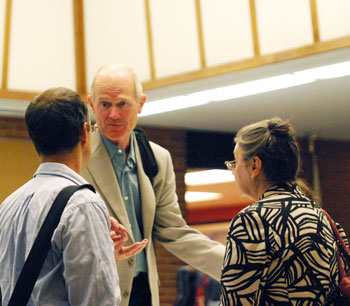
There was time for conversation after the council meeting. From right: Chuck Warpehoski (Ward 5), mayor John Hieftje, and Sabra Briere (Ward 1) (Photos by the writer.)
The council didn’t engage in substantive deliberations on any of its regular business items, but did pull three items off the consent agenda for more scrutiny: (1) an Oktoberfest street closure in downtown; (2) a dam safety inspection contract for the city’s two hydroelectric dams; and (3) a renewal of the maintenance and support agreement for CityWorks software.
The CityWorks software drew public commentary from resident Kathy Griswold – because the web-based citizen request system that a third-party developed a few years ago using the CityWorks API (application programmer interface) does not have a good mobile interface. To the extent that a better mobile interface would allow residents more easily to report problems with traffic-related lines of sight (such as excessive vegetation), that could result in safety improvements.
Pedestrian safety was the second point raised by Griswold, as she weighed in against the city’s crosswalk ordinance, which requires motorists to stop for pedestrians who are in the crosswalk or standing at the crosswalk. It’s a position that Griswold has taken on several occasions in her remarks to the council over the last two years. Her contention is that the city’s ordinance should be identical to the language in the Michigan Uniform Traffic Code, which does not require stopping and does not extend to cover pedestrians who are standing at a crosswalk but not within it.
Sabra Briere (Ward 1) picked up on the topic of pedestrian safety during communications time, and delivered remarks she’d prepared at the request of former city councilmember Leslie Morris. Morris had attended the previous day’s Sunday night caucus and had asked Briere to address the issue of a recent pedestrian fatality on Plymouth Road. Briere ticked through a number of statistics on traffic crashes involving a pedestrian.
The meeting featured two topics related to constitutionally protected speech – one raised during public commentary and the other raised less visibly, during a closed session on the settlement of a lawsuit.
During his turn at public commentary, James Rhodenhiser asked the council to consider expressing its view on a regular weekly anti-Israel protest that’s been held for nearly 10 years outside the Beth Israel Congregation. Rhodenhiser is rector at St. Clare of Assisi Episcopal Church, and conveyed a written document to the council indicating support from 31 other local clergy. The council has in the past approved two resolutions referring to the protests. The city has not been able to take any substantive action to compel the protesters to cease their activity, because the demonstration is constitutionally-protected free speech.
Another issue related to constitutionally-protected speech was the topic of a closed session held near the end of the meeting, which lasted about 15 minutes. When the council emerged from the closed session, a unanimous vote was taken to settle a lawsuit: Dobrowolski v. City of Ann Arbor. The lawsuit alleged that the city infringed on constitutionally-protected speech when it used its vehicle sign ordinance to prohibit anti-abortion signs. The city agreed to pay $7,000 in legal fees and $50 to the plaintiff, Paul Dobrowolski – to cover the tickets he was issued for his signs.
In some significant voting business, the council confirmed appointments to the boards of the Ann Arbor Downtown Development Authority and the Ann Arbor Area Transportation Authority. Sally Petersen (Ward 2) offered positive remarks about both appointees – Rishi Narayan to the board of the Ann Arbor DDA and Jack Bernard to the board of the AAATA.
Petersen highlighted one other appointment – Alison Stroud to the city’s commission on disability issues, noting that Stroud is hearing impaired and used the CART (Communication Access Realtime Translation) to follow along at meetings.
Consent Agenda
This is a group of items that are deemed to be routine and are voted on “all in one go.” Contracts for less than $100,000 can be placed on the consent agenda. The following items were on the council’s Aug. 19 consent agenda:
- Street closing: The block of West Washington between Main and Ashley, leaving intersections open for north-south traffic – for Oktoberfest on Sept. 20-21 (Grizzly Peak Brewing Company and the Blue Tractor).
- Street closing: The block of East Washington between Main and Fourth Avenue, leaving intersections open for north-south traffic – also for Oktoberfest on Sept. 20-21 (Arbor Brewing Company).
- Street closing: A half block of East Washington between Main eastward to the alley – for Lite Bike on Sept. 15 (Arbor Brewing Company and A2 Bike).
- Purchase order to Azteca Systems for CityWorks software license and annual maintenance and support agreement ($60,000). This software is based on a geographical information system (GIS) platform and allows the city to track the maintenance of its equipment and assets. It’s also the software on which the city’s citizen request system is based. However, according to city CFO Tom Crawford, responding to a query from The Chronicle, the city is currently evaluating whether to continue using the existing citizen request application or convert to something else.
- Professional services agreement with Mead and Hunt Inc. to complete a dam safety inspection and report for Barton and Superior dams ($53,600). This is an inspection required every five years by the Federal Energy Regulatory Commission (FERC) by an independent consultant. The last one was done in 2008. Mead and Hunt’s bid was the lowest of four bids. It was about half the highest bid for the work, which was submitted by Black & Veatch at $107,000.
- Purchase order to Michigan Supreme Court State Court Administrative Office for judicial information software (not to exceed $54,000). JIS is case management software provided to the 15th District Court, which the local court uses for day-to-day operations.
Councilmembers can pull any item off the consent agenda, and vote on them separately. Three items were pulled out for separate consideration.
Consent Agenda: Oktoberfest
Jane Lumm (Ward 2) pulled the item on Oktoberfest street closures off the consent agenda.
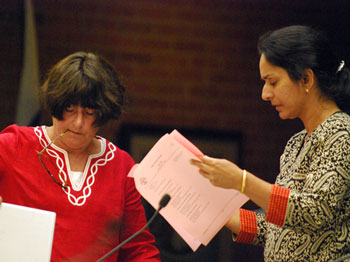
From left: Jane Lumm (Ward 2) and Sumi Kailasapathy (Ward 1) discuss the pink sheets on which nominations and appointments to city boards and commissions are printed.
She noted that the closure for the western portion of Washington Street started at 4 p.m. on Friday, Sept. 20, while the eastern street closure started at 8 a.m. on Friday. She asked if that’s what had been done in the past.
Sumedh Bahl, the city’s community services area administrator, indicated that the timing is a function of what the applicant requests. Mayor John Hieftje ventured that the difference in time might be related to the fact that people need to be able to get out of the Fourth and Washington parking structure. [However, the portion of the street that includes the entrance to the parking structure was requested to be closed at the earlier start time, which would not support the idea that the entrance to the parking structure was a determining factor in the timing.]
Outcome: The council voted unanimously to approve the Oktoberfest street closure.
Consent Agenda: CityWorks
The CityWorks item was addressed during public commentary reserved time at the start of the meeting by Kathy Griswold. She greeted the mayor and councilmembers, as well as people who might be Tweeting about the proceedings under the hashtag #a2council. She described CityWorks as a geographical information system, used to track service requests. It’s a very effective system, she said, but she characterized it as a mainframe system with a web interface, calling it “old technology.”
Griswold described herself as an IT professional who was qualified to talk about the subject. CityWorks does not have a mobile interface, she continued, and while it is supposed to interface with the See-Click-Fix mobile application, service requests that were put in over two months ago have not yet been addressed. As an example, she gave a request about vegetation obscuring a bike lane. She wanted to draw the council’s attention to the item, saying that she was not suggesting that the council not vote for the item – but she wanted to point out that CityWorks is only half of the solution. What’s needed, she said, is a mobile interface that will identify the GPS coordinates where, for example, there is vegetation obscuring a bike lane. The system is being used in several cities across the country including Boston, Chicago, and Grand Rapids.
Jane Lumm (Ward 2) pulled the CityWorks software agenda item off the consent agenda for separate discussion. She noted that the dollar amount was $60,000, and pointed to other software items on the consent agenda for $54,000 and $107,000. She wondered how the costs compared to the previous fiscal year. Tom Crawford, the city’s chief financial officer, told Lumm that he would have to look that up. But he indicated that generally such contracts are negotiated as multi-year agreements. And the idea is to try to keep them flat over the term of the contract. He described the maintenance costs as around 20% of the software cost.
Sumi Kailasapathy (Ward 1) picked up on Griswold’s public commentary on the lack of a mobile interface for CityWorks. She asked if there was some other software that might serve the needs of the city better than CityWorks. Crawford described CityWorks as a key piece of software for the city. And the city had not been looking at an alternative to CityWorks. He described how CityWorks offers an API – which is code that a third party can use to make a mobile application. What the city had done about five years ago, Crawford explained, was to create a customer service request web page. A third party had created that application for the city. The benefit at that time was that the city was at the forefront of having that kind of technology integrated into its website. The bad news, he continued, is that technology has moved along. What the city has in place now is not what you would consider to be ideal, Crawford allowed.
The city is currently discussing whether to ask a third party to develop a better mobile application, Crawford said. The contract the city council was voting on that night would stay in place regardless of what the city did in terms of having a third party develop a better mobile application, Crawford said.
Chuck Warpehoski (Ward 5) indicated that during the discussion he had looked up the dollar amounts for the CityWorks contract from the previous fiscal year, and reported it was the same last year as this year.
Outcome: The council voted unanimously to approve the CityWorks maintenance agreement.
Consent Agenda: Dam Safety Inspection
Margie Teall (Ward 4) pulled the dam safety inspection contract off the consent agenda for separate discussion. She asked Craig Hupy, public services area administrator, to come to the podium to answer questions.
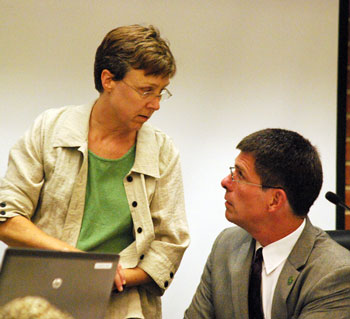
Margie Teall (Ward 4) talked with city administrator Steve Powers before the Aug. 19 meeting started.
Teall got confirmation from Hupy that the money was being paid for out of general fund dollars. She noted that the dams in question – Barton and Superior – were hydroelectric dams. She asked for a status report on the possibility of adding hydroelectric power generation to the city’s other two dams – Geddes and Argo.
Hupy said that about two years ago, a study was conducted to look at adding hydroelectric power to Argo and Geddes dams. In the open market of electric utilities, he described that possibility as not feasible. It’s only feasible if the interested party had credits for alternative energy generation. The single party in question was the Veterans Administration Hospital, which had made the decision that it did not make sense for them to move forward, Hupy said.
Teall asked about Geddes and Argo dam safety inspections: How would their safety inspections be funded? Hupy explained that those two dams are inspected under a different set of rules and regulations. The power dams are under federal jurisdiction, he explained. Geddes and Argo dams, in contrast, are under state regulation. And when those dams come up for inspection, they will be funded from the general fund. Teal indicated some surprise, saying “They will?” Hupy responded to her query by saying that they are recreation dams.
Teall indicated she understood that they’re recreation dams. She ventured that as recreation dams, their maintenance costs would be funded out of the park’s budget. Hupy indicated that he should have perhaps clarified that they might be funded out of the park’s portion of the general fund.
Sabra Briere (Ward 1) offered that while her recollection might be wrong, she thought that the council had made a budget decision in 2010 that moved the funding for dam maintenance out of the parks budget. Hupy told Briere that’s why he had been cautious in his wording. Briere said she’d remembered a lot of strong discussion about that.
Jane Lumm (Ward 2) then engaged Hupy in conversation about the hydroelectric dams in decades past – when they were accounted for in their own enterprise fund. Her recollection was that those funds had typically run a deficit. She wondered how dam safety inspections were funded at that time.
Hupy told her that they were funded out of the hydroelectric fund. But he also told Lumm that the hydroelectric fund actually broke even or made a small profit on the average year. On average, Barton Dam makes money, he said. On a good year, Superior Dam also makes money – but on an average year it doesn’t. The dams taken together were, Hupy explained, paying their own way. In the 1980s when the city had looked at converting the dams to hydroelectric, a study showed that Barton Dam would turn a profit and Superior Dam would be marginally profitable – and that has been borne out over the years, he concluded.
Lumm recalled that in the 1990s when the city had reached out to DTE to see if DTE was interested in acquiring ownership of the power facility, DTE was not interested because the funds were running a deficit at the time, Lumm contended. So DTE had no interest in taking ownership. But Lumm called it good news that the dams were breaking even or turning a slight profit. Mayor John Hieftje ventured that the increased cost of electricity might have impacted the profitability of the dams, and speculated that the trend would continue.
Outcome: The council voted unanimously to approve the dam safety inspection contract.
Crosswalks, Pedestrian Safety
Crosswalks and pedestrian safety was a topic that came up during public commentary, as well as in council communications. It was also a topic at the Sunday night caucus the evening before the council meeting.
Crosswalks, Pedestrian Safety: Background
The Michigan Uniform Traffic Code reads as follows:
R 28.1702 Rule 702. Pedestrians; right-of-way in crosswalk; violation as civil infraction.
(1) When traffic-control signals are not in place or are not in operation, the driver of a vehicle shall yield the right-of-way, slowing down or stopping if need be to so yield, to a pedestrian crossing the roadway within a crosswalk when the pedestrian is on the half of the roadway on which the vehicle is traveling or when the pedestrian is approaching so closely from the opposite half of the roadway as to be in danger, but a pedestrian shall not suddenly leave a curb or other place of safety and walk or run into a path of a vehicle that is so close that it is impossible for the driver to yield.
That contrasts in detail with the Ann Arbor city code, last revised on Dec. 19, 2011 after a revision a year earlier on July 19, 2010:
10:148. – Pedestrians crossing streets.
(a) When traffic-control signals are not in place or are not in operation, the driver of a vehicle shall stop before entering a crosswalk and yield the right-of-way to any pedestrian stopped at the curb, curb line or ramp leading to a crosswalk and to every pedestrian within a crosswalk when the pedestrian is on the half of the roadway on which the vehicle is traveling or when the pedestrian is approaching so closely from the opposite half of the roadway as to be in danger.
(b) A pedestrian shall not suddenly leave a curb or other place of safety and walk or run into a path of a vehicle that is so close that it is impossible for the driver to yield.
Crosswalks, Pedestrian Safety: Public Commentary
Kathy Griswold addressed the council during public commentary time at the start of the meeting on the topic of the city’s crosswalk ordinance. She told the council that they should immediately rescind the ordinance. Questions need to be asked like: Is it enforceable? Is it consistent with surrounding committees? Can we effectively educate drivers who visit the city? Was the ordinance motivated by safety, or by a desire to win awards?
She described herself as “so angry,” because she found a brochure in the lobby of city hall with the basic message of “Pedestrians Rule.” The message to pedestrians is that “they rule” and on the back of the brochure is a description of all the awards that the city has won. She called it “shameful.” She called on the council to hire an independent professional engineer who has transportation engineering expertise. She told the council that she herself did not have that expertise and was not making recommendations. No one without that expertise should be making those recommendations, she concluded.
Sabra Briere (Ward 1) used her council communications time to comment on the topic of pedestrian safety in crosswalks. Her comments came in the context of a request from former city councilmember Leslie Morris, who had attended the Sunday night caucus the evening before the Aug. 19 meeting and asked Briere to speak about the issue.
Briere gave several descriptive generalizations based on data pulled from the Michigan Traffic Crash Facts website for 2004-2012. Among those generalizations was the fact that the majority of traffic crashes involving pedestrians take place in the downtown area. That’s illustrated in Map 1. [Or see also this animated map]
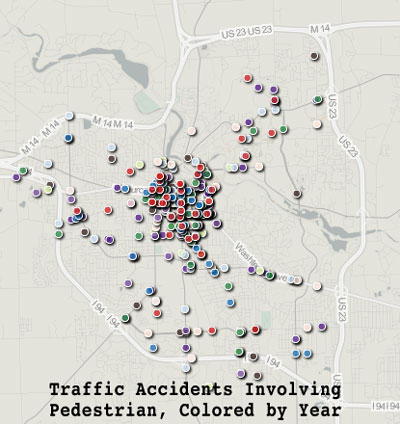
Map 1. Traffic accidents involving a pedestrian, colored by year. (Data from the MichiganCrashFacts.org, mapped by The Chronicle using geocommons.com)
While Briere characterized some downtown intersections as dangerous for pedestrians, the higher frequency of pedestrian-related traffic crashes could simply be a function of higher pedestrian volumes in the downtown area. Based on data provided by the city of Ann Arbor to The Chronicle from its non-motorized counts conducted from 7 a.m. to 7 p.m. at various locations, higher pedestrian counts are confirmed in the downtown area. That’s illustrated in Map 2.
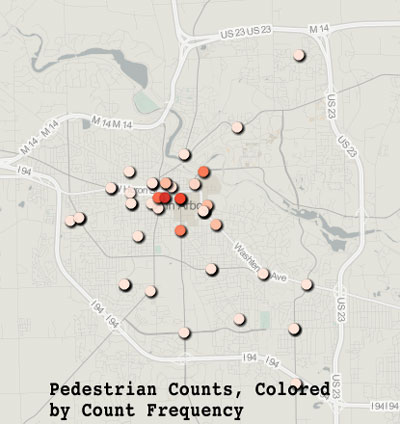
Map 2. Pedestrian counts, colored by frequency. Darker red indicates higher counts. (Data from the city of Ann Arbor’s Non-Motorized Counts, mapped by The Chronicle using geocommons.com)
Briere included in her remarks the fact that traffic accidents related to pedestrians also show consistent seasonal variation. That’s illustrated in Chart 3 and Chart 4.
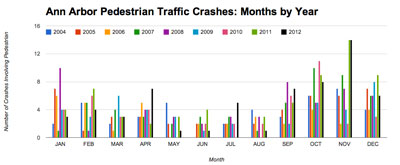
Chart 3: Ann Arbor pedestrian traffic crashes: Months by year. (Chart by The Chronicle with data from MichiganTrafficCrashFacts.org)
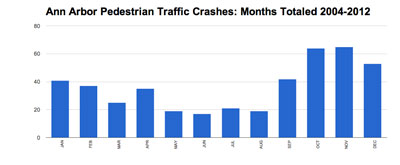
Chart 4: Ann Arbor pedestrian traffic crashes: Months totaled – 2004-2012. (Chart by The Chronicle with data from MichiganTrafficCrashFacts.org)
It’s possible to speculate that Ann Arbor’s seasonal pattern is a function of the influx of University of Michigan students, and Briere alluded indirectly to that idea. She also noted that as fall approaches, daylight is more limited.
As an preliminary exploration of student influx or limited daylight as a factor influencing traffic accidents involving pedestrians, it would be useful to compare Ann Arbor’s stats with another medium-sized Michigan city, like Flint, that does not have a correspondingly large population of university students. Chart 5 illustrates that while Flint’s month-to-month pattern shares a limited set of characteristics with Ann Arbor’s seasonal pattern, it’s not nearly as pronounced.
In her remarks, Briere mentioned the fact that in Ann Arbor, the number of traffic crashes involving pedestrians has been somewhat higher the last two years than any of the previous seven years. That’s illustrated in Chart 6.
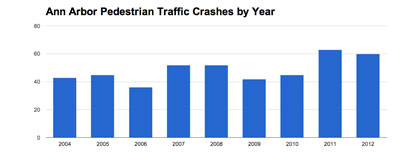
Chart 6: Ann Arbor pedestrian traffic crashes by year. (Chart by The Chronicle with data from MichiganTrafficCrashFacts.org)
Briere did not touch on the nature of injuries resulting from traffic accidents involving pedestrians. However, mapping out such injuries, there appears to be a less downtown-centric distribution of locations than accidents overall. That’s shown in Map 7.
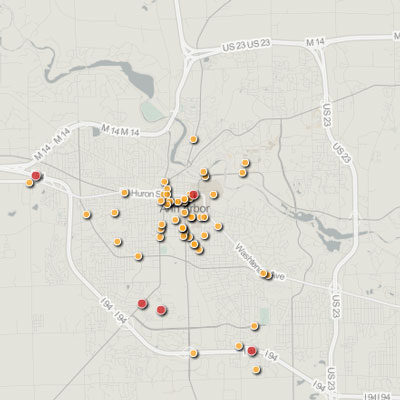
Map 7: Ann Arbor pedestrian traffic crashes incapacitating and fatal injuries – 2004-2012. (Data from the MichiganCrashFacts.org, mapped by The Chronicle using geocommons.com)
Protected Speech
Two issues related to protected speech were touched on at the council’s Aug. 19 meeting. One involved anti-Israel protests outside a local synagogue. The other involved the settlement of a lawsuit over ticketing of anti-abortion signs.
Protected Speech: Protests Outside Beth Israel
James Rhodenhiser picked up on the mention of the 50th year anniversary of Martin Luther King Jr.’s “I Have a Dream” speech, which Thomas Partridge had highlighted during public commentary preceding Rhodenhiser’s remarks. Rhodenhiser said that the city of Ann Arbor has a similar but “unhappy anniversary” that is coming up, the 10th anniversary – just after Rhodenhiser arrived in town – of a small group of protesters outside of the Beth Israel Congregation on Washtenaw Avenue.
He described protesters as exhibiting “hateful behavior.” He noted that the city council had in the past gone on record, condemning the protests. When his children attend bar mitzvahs and bat mitzvahs at the Beth Israel Congregation, they ask, “Who are these people and why are they picking on this congregation?” Rhodenhiser told the council that he’d reached out to the group of protesters, and contended that there was no reason he could discern why the Beth Israel Congregation has been singled out – other than the fact that it has the word Israel in its name. He contended that the congregation had been targeted and scapegoated for the actions of a foreign government. They are no more guilty than any other U.S. citizen, he contended.
Rhodenhiser told the council that he had given the clerk a letter signed by 31 religious leaders in Ann Arbor, encouraging the council to express, “What kind of city we are.” Respect for free speech, he continued, does not “countenance scapegoating a religious minority for positions they do not hold.” He called on the council to follow the example of Dearborn, Mich. He’d attended a large gathering at a mosque when the Muslim community there was being targeted, and he called it impressive how the political and religious leaders had come together to say: “This is not what Dearborn is about.” He believed that Ann Arbor should do likewise. He called it a question of what kind of community Ann Arbor wants to be.
Rhodenhiser asked the city council to mark the 10th anniversary of the protest outside Beth Israel Congregation by encouraging civility and encouraging engagement with the rest of the community – which is equally as guilty – and not picking on this one congregation. The Beth Israel Congregation has many members who’ve gone on record in support of peace and justice in the Middle East. He asked the council again to go on record as supportive of the congregants of Beth Israel, who feel that its community’s burden might go unremarked on the anniversary.
Mayor John Hieftje responded during communications time to the public commentary by Rhodenhiser. Hieftje reported that he’d sat in on a meeting when the leader of the protesters had met with religious leaders. He said it was not a negotiation, but he called it a very good conversation. “The rationality and the logic that was presented seemed to fall on deaf ears,” Hieftje said. They did reach out, Hieftje said, and he thought it had been done a couple of times to try to bring some reason to the protests.
“I was there and saw the steps they took and there is no positive outcome from it, obviously,” Hieftje said. Last year he had spoken at the synagogue, Hieftje continued, and talked for about an hour and a half with members of the synagogue about these issues. “There’s a great deal of frustration there,” he said. Anything new that the council could do, Hieftje said, he thought would be good. He noted that the council passed resolution a long time ago and had also taken some more recent actions. He called it a very tough problem, that attorneys had worked on.
By way of additional background, the past action of the council included a resolution approved on Sept. 20, 2010 on religious freedom, which referred to a previous resolution passed on Oct. 18, 2004 condemning the protests outside the Beth Israel Congregation. During deliberations on the 2010 resolution, specific reference to Muslims was amended out of the resolution. Chuck Warpehoski (Ward 5), who was at the time not yet elected to the city council, addressed the council on the occasion of the 2010 vote, urging the council to pass the resolution.
Protected Speech: Anti-Abortion Signs
Toward the end of the Aug. 19 meeting, the council voted to enter into a closed session under Michigan’s Open Meetings Act to discuss two items – land acquisition and pending litigation.
When the council emerged from closed session about 15 minutes later, the council voted to resolve the Dobrowolski v. City of Ann Arbor case in the manner recommended in the closed session.
The suit was filed on April 23, 2013 in the Michigan Eastern District of the U.S. District Court. The plaintiff, Paul Dobrowolski, had been ticketed for displaying anti-abortion signs in his vehicle. The city of Ann Arbor issued the tickets under the following city code:
Section 10:60 Prohibitions for certain purposes.
No person shall park a vehicle upon any street or highway for the principal purpose of:
(1) Displaying such vehicle for sale;
(2) Washing, polishing, greasing, or repairing such vehicle, except repairs necessitated by an emergency;
(3) Displaying advertising;
(4) Selling merchandise from such vehicle except in a duly established market place, or when so authorized or licensed under Title 7 of this Code.
The suit argued that the city ordinance is on its face, and as applied to Dobrowolski’s signs, a content-based restriction on speech in a traditional public forum. The ordinance was enacted in 1970.
The stipulated order that has now been filed by the Michigan Eastern District of the U.S. District Court requires the city of Ann Arbor to pay $7,000 in attorney fees and $50 to Dobrowolski. The amount paid to Dobrowolski covers the tickets he was issued by the city for displaying anti-abortion signs in his vehicle while parked on a city street.
According to the complaint, Dobrowolski was ticketed twice, at $25 each, and on other occasions informed with windshield notices that under the city’s abandoned vehicle ordinance, he had to move his vehicle.
The stipulated order permanently enjoins the city of Ann Arbor against enforcing its city ordinance against Dobrowolski’s vehicle signs. The settlement is an implicit acknowledgment by the city that the ordinance would not survive strict scrutiny.
Nominations, Appointments to Boards and Commissions
If a pending council rule change is adopted at the council’s Sept. 3, 2013 meeting, the announcement of nominations and votes on confirmation for board and commission appointments would be moved on the agenda toward the start of the meeting. On Aug. 19, however, these items were handled toward the end of the meeting as part of mayoral communications, which comes after all the other voting business.
The Ann Arbor city council was asked to confirm appointments to the boards of two key organizations – the Ann Arbor Downtown Development Authority and the Ann Arbor Area Transportation Authority.
Nominations, Appointments: DDA
Rishi Narayan had been nominated for appointment to the board of the Ann Arbor DDA at the council’s previous meeting on Aug. 8.
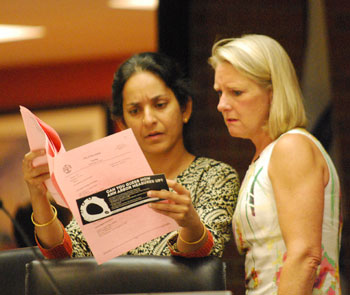
From left: Sumi Kailasapathy (Ward 1) and Sally Petersen (Ward 2) appear a little puzzled about the contents of the pink packet, which contains a list of nominations and appointments to boards and commissions.
On the DDA board, Narayan is replacing Leah Gunn, who did not seek reappointment to the board this July after serving nearly 22 years, starting in 1991. Narayan is founder and managing member of Underground Printing, which offers screenprinting of apparel in more than a dozen cities nationwide. Narayan made the Crain’s Detroit Business “Twenty in their 20s” list in 2010 as a 28-year-old.
Council deliberations on Narayan’s appointment consisted of some remarks from Sally Petersen (Ward 2). She said she was pleased to see Narayan nominated to serve on the board of the DDA. She described him as a successful entrepreneur, a former resident of downtown and now a resident of Ward 2 [which Petersen represents]. He represents younger urban professionals, she said, “the genre of person we are always trying to attract.” In her mind, the future of Ann Arbor does depend young urban professionals for moving to, and hopefully staying in Ann Arbor.
Outcome: The council voted to confirm Narayan’s appointment to the DDA board on the same vote approving all nominations that night.
Narayan’s appointment still leaves two positions unfilled on the DDA board. One of those resulted from the departure of Newcombe Clark, who made an employment-related move to Chicago and thus was not reappointed after serving a four-year term. The other slot that needs to be filled is that of Nader Nassif, who resigned from the board after being arrested on a sexual assault charge.
Al McWilliams was nominated to replace Clark at the council’s Aug. 19 meeting. McWilliams’ name had appeared on an early version of the list of nominees for the council’s Aug. 8 meeting. The final version for that meeting, however, did not include his name. McWilliams is founder of Quack!Media, an ad agency located in downtown Ann Arbor. Quack!Media lists the Ann Arbor Area Transportation Authority on its website as one of its clients. McWilliams has written advocacy pieces for bicycling on his blog.
Nominations, Appointments: AAATA
Also nominated at the council’s previous meeting on Aug. 8 was Jack Bernard to serve to the board of the Ann Arbor Area Transportation Authority. Bernard is a lecturer in the University of Michigan law school and an attorney with UM’s office of the vice president and general counsel. He is also currently chair of the university’s council for disability concerns.
Bernard’s addition brings the total of UM employees on the AAATA board to three, or one-third of the nine members. The other two UM employees on the AAATA board are Sue Gott (the university’s head planner) and Anya Dale (a representative in the office of sustainability).
Bernard’s appointment fills the seat resulting from the newly expanded AAATA board, from seven to nine members. The other new member, appointed by the city of Ypsilanti, was Gillian Ream.
Before the vote on confirmations was taken, Sally Petersen (Ward 2) noted that Bernard is currently chair of the University of Michigan’s council for disability concerns. She noted that she is also a member of that group as a liaison between the city’s commission on disability issues. She paraphrased from some material written by others, which described Bernard as a clear-thinking, multi-talented positive individual who has a wonderful intelligent attitude about collaborative efforts. He was called an effective advocate and mentor for people with disabilities – based on his personal experience and his innate sense of justice. She noted that he is legally blind, and will offer that unique perspective on the Ann Arbor Area Transportation Authority board.
Outcome: The council voted to confirm Bernard’s appointment to the AAATA board on the same vote approving all nominations that night.
Nominations, Appointments: Commission on Disability Issues
The council also considered the appointment of Alison Stroud to the Ann Arbor commission on disability issues. She’d been nominated at the council’s previous meeting on Aug. 8. Stroud is finishing the term of Ian Scott. Stroud is a public policy intern for the summer at the Ann Arbor Center for Independent Living. She addressed the board of the Ann Arbor Area Transportation Authority during a public hearing at its June 20, 2013 meeting.
During the Aug. 19 city council meeting, before the vote on all confirmations was taken, Petersen pointed out that Stroud has a Pittsfield Township address. Typically appointees are supposed to live in Ann Arbor, Petersen allowed, but in this case there was an opening on the commission. And Stroud is hearing impaired, relying on the CART (Communication Access Realtime Translation) program to follow along at meetings. There is not anyone currently on the commission who is hearing-impaired, so Stroud offers a unique perspective that is not currently represented, Petersen said. So she hoped that the Ann Arbor residency requirement would be waived.
The waiver of the residency requirement simply requires a seven-vote majority on the 11-member council. From the city charter [emphasis added]:
Eligibility for City Office – General Qualifications.
SECTION 12.2. Except as otherwise provided in this charter, a person is eligible to hold a city office if the person has been a registered elector of the city, or of territory annexed to the city or both, and, in the case of a council member, a resident of the ward from which elected, for at least one year immediately preceding election or appointment. This requirement may be waived as to appointive officers by resolution concurred in by not less than seven members of the council.
Outcome: The council voted to confirm Stroud’s appointment to the commission on disability issues on the same vote approving all nominations that night.
Nominations, Appointments: Miscellaneous
Other appointments confirmed by the council at its Aug. 19 meeting were:
- Paul Darling (reappointment) to the Building Board of Appeals.
- Reka Farrakand to the Housing Board of Appeals. Farrakand is city of Ann Arbor fire marshal.
- Alex Milshteyn (reappointment) to the Zoning Board of Appeals.
Nominations made on Aug. 19 that will be voted on at the council’s next meeting on Sept. 3 included: Leigh Greden’s reappointment to the Ann Arbor housing commission; Devon Akmon’s appointment to fill a vacancy on the public art commission; and Logan Casey to fill a vacancy on the human rights commission.
Communications and Comment
Every city council agenda contains multiple slots for councilmembers and the city administrator to give updates or make announcements about important issues that are coming before the council. And every meeting typically includes public commentary on subjects not necessarily on the agenda.
Comm/Comm: Human Rights Commission – Video, Non-Discrimination
During the council communications time at the start of the meeting, Sumi Kailasapathy (Ward 1) reported out on some activities of the human rights commission. The commission is working on a revision to the city’s non-discrimination ordinance, and it’s being reviewed by the city attorney’s office. The revision would be brought to a city council work session in the near future, she said.
Kailasapathy also reported that the human rights commission is requesting that progress be made on developing administrative guidelines for installing public surveillance video cameras – in the context of the council’s recent rejection of an ordinance that would regulate the installation of such cameras. The council also heard public commentary on the topic – from the point of view of technology – at its previous meeting on Aug. 8, 2013.
Comm/Comm: Policing (University of Michigan Student Move-In)
During communications time, city administrator Steve Powers announced that the swearing-in ceremony of the four newest Ann Arbor city police officers would take place on Friday, Aug. 23, at 1 p.m. in city council chambers.
He alerted the public to the fact that the University of Michigan student move-in would be taking place primarily August 28-30. Classes are scheduled to begin Tuesday, Sept. 3, he said. With the “positive return of the students,” Powers also noted that “some issues” accompanied that. The Ann Arbor police department’s “party patrol” would be deployed each night from the beginning of student move-in until the Sunday before classes began, he said. The staffing for each weekend in September, as well as on all home football games for the remainder of the season, would be increased. Emphasis by the AAPD would be on alcohol and noise enforcement, Powers said.
Residents are encouraged to call the city’s non-emergency police number: 994-2911. But Powers indicated that residents are also welcome to call 911 as the non-emergency number. A high presence of uniformed officers would be maintained during the party patrol, Powers concluded.
Comm/Comm: Liquor Committee
During council communications time at the conclusion of the meeting, Jane Lumm (Ward 2) gave an update from the council’s liquor committee. A recommendation would be coming to the council about the fee schedule, she reported. Adjustments would be made to make sure that fees charged by the city reflect the costs. A recommendation on liquor license transfer procedures will also be forthcoming, Lumm said, in light of a change in state law. She thanks the various staff who are involved in the annual renewal of licenses, and indicated that their time investment would be tracked.
Mike Anglin (Ward 5) followed up on Lumm’s remarks by saying that 133 establishments in Ann Arbor hold liquor licenses. Each one pays $50 a year, Anglin said.
Comm/Comm: North Main Huron River Corridor Task Force
Sabra Briere (Ward 1) gave an update from the North Main Huron River corridor task force, indicating that the report is almost finished. Demolition of the two buildings on 721 N. Main was taking place that day, she noted.
Comm/Comm: Flooding
During council communications time, Mike Anglin (Ward 5) addressed the topic of water issues and recent flooding. His remarks dealt with the general topic of providing detention facilities for stormwater. He observed that the city has money in the open space and parkland preservation fund that can also be used to acquire land within the city’s borders. He ventured that sites could be identified now within the city to establish stormwater detention facilities. It’s important to find locations farther upstream in order to mitigate flooding, he said. He ventured that the city might in 50 years have less flooding – even if more development takes place – if the city takes advantage of the locations that are available now. Rather than undertaking large infrastructure projects, he called for undertaking “natural projects.”
Comm/Comm: Living Wage Ordinance
During public commentary at the conclusion of the meeting, Jim Mogensen commented on the hardship exemption in the city’s living wage ordinance. He recalled the history for its rationale – a recognition that some nonprofits were not able to comply with the requirements of the ordinance. He recounted how the exemption for the Ann Arbor Summer Festival was handled, and how an exemption was also inserted into the ordinance for work-study students. Last fall, the issue had arisen again, he observed. Mogensen was bringing it up to provide the history, he said, because a waiver had been granted last fall to Community Action Network over work-study students, he said, who were already exempt under the ordinance.
Comm/Comm: Martin Luther King, Jr.
Thomas Partridge addressed the council during public commentary reserved time, introducing himself as a resident of Washtenaw County and the city of Ann Arbor. He called himself an advocate of all those residents of the city and county who need more vital government services. He called for such services to be provided in a way that would end historic discrimination. He told the council that he was there on the eve of the 50th anniversary of Martin Luther King Jr.’s March on Washington, and the speech that King delivered on Aug. 28, 1963 – the “I Have a Dream” speech. Partridge called on the residents of the city and the county to make King’s dream a reality. He called for an investigation of what he called misappropriation of funds, which were now needed to expand public affordable housing and public transportation.
During public commentary at the conclusion of the meeting, Partridge repeated the points from his initial public commentary – Martin Luther King Jr.’s “I Have a Dream” speech and his candidacy for Ward 5 city council as a write-in candidate. [Partridge has filed the paperwork to qualify as a declared candidate, so votes written in for Partridge would count.] He lamented the lack of sufficient affordable housing and effective public transportation in Ann Arbor.
Present: Jane Lumm, Mike Anglin, Margie Teall, Sabra Briere, Sumi Kailasapathy, Sally Petersen, Marcia Higgins, John Hieftje, Chuck Warpehoski.
Absent: Stephen Kunselman, Christopher Taylor.
Next council meeting: Tuesday, Sept. 3, 2013 at 7 p.m. in the council chambers at 301 E. Huron. [Check Chronicle event listings to confirm date]
The Chronicle could not survive without regular voluntary subscriptions to support our coverage of public bodies like the Ann Arbor city council. We sit on the hard bench so that you don’t have to. Click this link for details: Subscribe to The Chronicle. And if you’re already supporting us, please encourage your friends, neighbors and colleagues to help support The Chronicle, too!




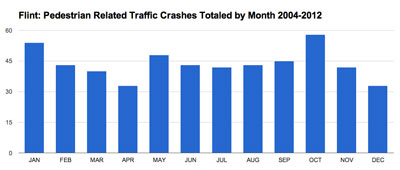
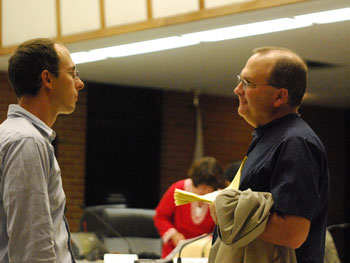
“He represents younger urban professionals, she said, ‘the genre of person we are always trying to attract.’ In her mind, the future of Ann Arbor does depend young urban professionals for moving to, and hopefully staying in Ann Arbor.”
I’m not coming up with anything generous to say about that agist statement. Why are “we” even trying to attract anyone of any “genre”? What is it about the current residents that just. isn’t. good. enough? Are we dying too fast? Eating too little? Not buying enough? Not having enough kids?
The growth-is-good mentality is becoming outdated. Yuppies aren’t going to change that.
Congratulations to the American Freedom Law Center and its counsel appearing in the Dobrowolski case in federal court -Robert Muise and David Yerushalmi.
The $7,050 victory over the City of Ann Arbor along with a permanent injunction against ordinance enforcement was a great victory for the First Amendment and all citizens.